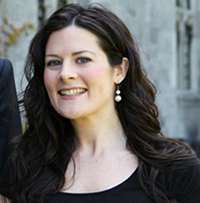 International Research Fellow, Ph.D.
International Research Fellow, Ph.D.
aisling.depaor@dcu.ieDr. Aisling de Paor, Lecturer in Law at Dublin City University and Honorary Fellow at the Burton Blatt, Syracuse University, New York has recently been awarded a Royal Irish Academy Charlemont Grant to travel to the Burton Blatt Institute in June 2018.
While at the Burton Blatt Institute she will collaborate with Professor Peter Blanck on a research project entitled ‘Gene editing, disability and the UN Convention on the Rights of Persons with Disabilities – emerging law and policy perspectives.’ This research highlights the concerns raised as genetic science and technology advances, including the consequences for disability rights. On examining international human rights perspectives, it looks particularly at the United Nations (UN) Convention on the Rights of Persons with Disabilities and how it can be applied to develop best practice in this area. It will focus on cutting edge developments in the field of gene editing and the ethical, legal and regulatory concerns that are quickly emerging in this area.
CRISPR/Cas 9 is a gene-editing technology at the cutting edge of science and medicine, and is gaining attention worldwide. CRISPR/Cas 9 may ultimately be used to eradicate serious disease, such as hereditary neurological conditions, cystic fibrosis and different types of cancer, thereby preventing genetic- based disease, with consequences for future generations. It therefore has wide-ranging implications for medicine, society and the human race. Recent developments in the area of gene editing (in the United States, United Kingdom and elsewhere) signal significant advances and growing application of this new technology in the future.
Although offering substantial opportunities for understanding health and medicine, the emergence of gene- editing highlights a minefield of ethical, legal and practical challenges in both clinical and commercial contexts, and in society. In addition to the safety concerns arising with these genetic techniques and the unknown medical implications of gene editing for future generations, there are many ethical and legal questions arising. One concern centres on the potential trend towards embracing ‘designer babies’ and facilitating the selection of embryos based upon genetic desirability. In addition to offering the possibility of eradicating human disease, developments in gene editing open the door to engineering the genetic makeup of children and selecting traits and characteristics such as hair and eye colour, intelligence, or sporting ability. Disability perspectives are particularly relevant in this area. Advances in the field of genetics provide a new lens to view, identify and now eradicate disability. With developing gene- editing technologies there is a concern that the technology will be used to screen out disability, difference and diversity in society, provoking a range of human rights concerns for persons with (current and future) disabilities.
A regulatory vacuum in this area signals the need for caution and there is a growing need to address the complex ethical and legal concerns that accompany use of these new technologies. This research will examine the need for regulation to prevent misuse of these new technologies and also to facilitate safe and ethical scientific advances. In addition, it will identify further strategies for addressing this area, such as awareness raising and education, and public consultation and engagement on these issues. The proposed research will make a valuable law and policy contribution to this area, particularly in presenting disability perspectives, and in using the UN Convention on the Rights of Persons with Disabilities as a tool to guide best practice in this area. This collaboration between Dr. de Paor of Dublin City University and Prof. Blanck of the Burton Blatt Institute, Syracuse University will strengthen the research base in Ireland and the United States, and contribute to knowledge and policy-making in this field.
While visiting the Burton Blatt Institute, Aisling will also give a research seminar to the faculty at the Burton Blatt Institute, and other academics and students at Syracuse University on the topic of genetics law and policy, specifically on gene editing, disability and the UN Convention on the Rights of Persons with Disabilities.